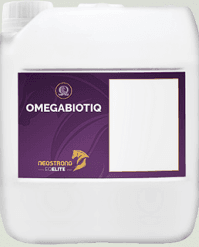
Content sponsored by:
LIPTOSA
Effects of oils in the horse´s diet
Published: September 20, 2023
By: Míriam Redondo, Veterinarian
The inclusion of oil and fat in the horses’ diets has been a common practice for over 20 years. Their main benefit are energy supply and improved digestive transit. But they also provide essential fatty acids, increased absorption of fat-soluble vitamins, reduced caloric gain, increased energy efficiency and reduced dust in the feed ration, helping to prevent upper respiratory tract diseases.
In sport horses, increased energy requirements are one of the most noticeable effects of physical activity. A common practice is to increase the cereal feeding, allowing higher levels of readily available carbohydrates. However, starchy diets are a well-known risk factor associated with the development of gastrointestinal disorders and other diseases such as laminitis. In addition, starchy diets are strongly related to horse's behaviour as they cause nervousness and excitement. Several studies also suggest that hyperglycaemia or hyperinsulinaemia, linked to cereal intake, influence the incidence of osteochondrosis.
Therefore, partial substitution of cereals by oil is an excellent alternative to increase the diet's energy density, together with a reduction in the amount of starch by decreasing the volume of cereals consumed.
This feeding strategy has improved the performance of sport horses, being especially beneficial for horses exercising in hot conditions, due to the lower caloric increase. About 3% extra heat is produced by the oxidation of glucose during ATP formation, compared to free fatty acid oxidation. Horses fed oil-supplemented diets have a higher efficiency of free fatty acid oxidation, preserving muscle and liver glycogen stores during exercise. Due to this higher capacity for oxidation of fatty acids, there is a greater risk of increased oxidation reactions in the body which can lead to an excess of free radicals. It is therefore advisable to add vitamin E as an antioxidant to counteract this oxidative effect.
OMEGA-3 ANDOMEGA-6 ACIDS
Currently, special attention is given to the type of oil used based on its polyunsaturated fatty acid content. Omega-3 and omega-6 fatty acids are considered the most important in this group. Both are considered "essential" as they are necessary for the normal functioning of all systems but cannot be synthesized by the organism and must be supplied by the diet.
The three most important omega-3 fatty acids are alpha-linolenic acid (ALA), eicosapentaenoic acid (EPA) and docosahexaenoic acid (DHA). ALA is found mainly in grasses, forages, and vegetable oils such as linseed and soybean oil. DHA and EPA are found in fish oil.

Omega-6 fatty acids (such as linoleic acid) are found mainly in cereals and oils such as corn and sunflower oil.

A correct balance between omega-3 and omega-6 fatty acids is essential for them to be effective. Both are necessary in the regulation of inflammatory processes: omega-6 acids as activators of inflammation and omega-3 acids as down-modulators. The ideal ratio is not exactly known. But considering that horse's natural diet is mainly based on pasture and forage (with a high proportion of omega-3 acids), and that in practice they often receive diets with little forage and large amounts of feed or cereals (with a high proportion of omega-6), supplementation with omega-3 fatty acids should be considered. An excess of omega-6 fatty acids in the diet can inhibit the metabolism of omega-3 fatty acids. This can lead to an imbalance between the biologically active compounds (which are mutual antagonists) synthesized from them.
OIL SUPPLEMENTATION
For this reason, common vegetable oils such as sunflower oil, rapeseed oil or corn oil are being replaced by fish oil or linseed oil. Linseed oil is the richest vegetable source of alpha-linolenic acid (ALA) with a very favourable ratio of omega-6 to omega-3 fatty acids.
Dietary supplementation with omega-3 fatty acids has been associated with anti-inflammatory effects resulting from alterations in arachidonic acid (ARA) metabolism. This may help to reduce inflammatory and allergic reactions, improve blood lipid profile, and increase tissue sensitivity to insulin. In the diet of horses, linseed oil has been used as a laxative and to treat inflammatory and allergic skin conditions.
In conclusion, the addition of linseed oil to the horse’s diet can improve antioxidant capacity for optimal health and performance.
NEOSTRONG EQ has developed OMEGABIOTIQ, a supplement based on a blend of vegetable oils (such as linseed oil), vitamins A, D3 and E, probiotics and lecithins.

OMEGABIOTIQ is recommended for the recovery of animals in poor body condition, to improve performance of sport horses in intensive training and competition, or simply to maintain optimal digestive function and general health. It also contributes to the improvement of skin and coat in horses suffering from allergic processes such as summer seasonal recurrent dermatitis (sweet itch).

Related topics:
Recommend
Comment
Share

Would you like to discuss another topic? Create a new post to engage with experts in the community.